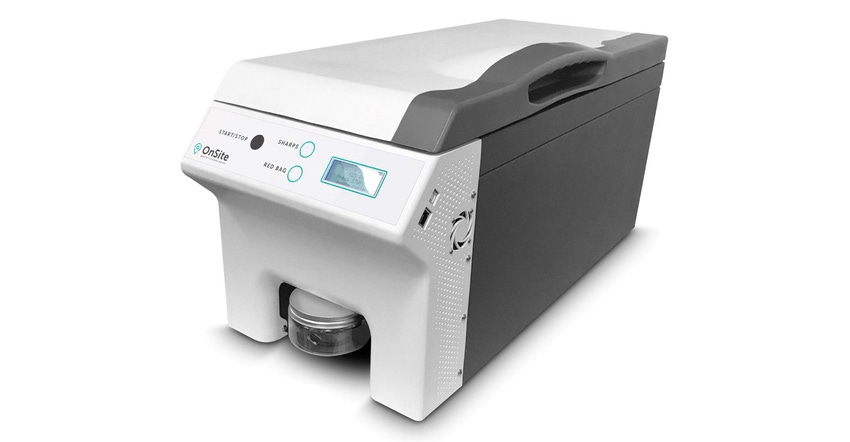
Currently, there are only a few ways that infectious medical waste can be safely and legally treated, mainly by chemical processes or thermal processes involving high heat. But OnSiteWaste Technologies has found another method, at least for small-quantity generators such as family medical practices, dental offices, skilled nursing facilities and labs.
OnSite Waste, based in Newport Beach, Calif., has built a small unit that enables generators to process sharps and red bag waste at their own sites, eliminating the need to contract with processors and haulers of hazardous waste. The process takes about three hours with only 15% residual remaining, which can be disposed of in the municipal solid waste stream, according to the company.
“Currently, small-quantity generators deal with a process dictated by haulers,” says Brad Barnes, CEO of OnSite Waste Technologies. “Our goal was to build a device with smart technology to put in their offices so they can process their own infectious waste in accordance with regulatory stipulations and in the volumes they generate, at the precise time they want, so they don’t have to store this infectious waste.”
With the needs of their target customer base in mind, the company developed a system that could be placed on a desktop and would not generate heat, noise or odor.
The differentiator between OnSite’s product, branded the TE-5000, and other options is portability, Barnes says. The unit can be moved into any area of the office or facility.
“We designed it to be as simple for the user as possible,” he says.
The system has been vetted by third-party labs and has been shown to kill infectious waste and render the small quantity of residuals non-reusable.
The TE-5000 uses thermal heat at relatively low temperatures to process medical waste and turn it into “regular” trash. Once the waste is collected in the proprietary container, which holds about 200 sharps, the container is placed into the unit, which heats to a temperature of 380 to 400 degrees Fahrenheit within 30 minutes, and remains at that temperature for 90 minutes. This is followed by a 30-minute cooling period. The process reduces waste by 85%. The residual, which consists of melted plastic from the sharps, is deemed non-reusable and non-biohazardous.
OnSite Waste is scheduled to deliver its first 600 units in late summer or early fall of 2020. Each unit will process about one gallon per cycle, and the average customer would run about 16 cycles a month.
Intervala is manufacturing the medical waste processing units while OnSite Waste manages the marketing. Intervala has worked with medical equipment companies for decades, but OnSite Waste is its first customer in the medical waste management equipment market.
“Our work with OnSite Waste is right in our sweet spot,” says Teresa Huber, Intervala president and CEO. “We primarily work with companies that are leaders or innovators in the industrial, medical, transportation, and defense industries. Their products generally are very specialized and often must be produced to strict quality or regulatory standards.”
Huber says that while OnSite was creating the new product, the company recognized it would need assistance fine-tuning the process and bringing it to fruition in the marketplace.
“The team at OnSite developed this revolutionary product but needed a full-service manufacturing partner to ensure that the design was manufacturable, to help them make any necessary modifications and help them take it to market,” says Huber. “We are thrilled to assist OnSite Waste in taking their exciting technology to market.”
While there are few options for complete onsite management of hazardous medical waste, there are a handful of companies focusing on offering simplified alternatives for generators at their locations. For example, Sterilis Solutions, headquartered in Chicago, sells a unit thatit says turns sharps and red bag waste into “harmless confetti to be thrown safely in the regular trash.”
And in the pharmaceutical waste management space, Stericyle delivers cannisters to health care providers that contain charcoal that renders discarded drugs inert, though the process produces a residual that the company has to come and pick up.
Now, as OnSite moves forward to penetrate its target market, it is focusing on organizations with multiple locations such as allergy clinics and retail pharmacies that are seeking to reduce their waste disposal costs.
“We are going after markets to disrupt trucks on the highway and not only reduce environmental impact, but also provide end users the flexibility to work with technology at their facility,” says Barnes.
Although these small units will fill a void for small generators and reduce their need for hauling services, Barnes says that is not necessarily a negative for haulers.
“It does not tend to be economically feasible with routing to frequently pick up from small generators who may be geographically spaced out,” says Barnes. “They could partner with us to bring us business that might not make sense for them.”
About the Author(s)
You May Also Like




